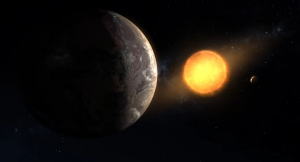The Arab world’s first interplanetary mission, due to launch in 40 days’ time and reach the orbit of Mars in February next year, is about the survival and future of the entire Middle East, the leaders of the United Arab Emirates project have declared.
The mission is also the latest sign that the old cartel of space exploration, once confined to the superpowers, is being broken up by new national entrants or private sector firms.
The “Hope Mars mission”, due to be launched on 15 July, has been in preparation by the United Arab Emirates since 2014, and according to the project manager, Omran Sharaf, is seen as integral to the country’s long-term economic development. “It is about the future of the UAE and our survival,” Sharaf said.
The mission’s objective is not to land on Mars, but to orbit the planet to study the dynamics of its atmosphere over an entire Martian year and form a more complete picture of its climate.
Visit Greece’s own exotic Bali beach! (photo-video)
One aim is to find out more about what led to the planet’s atmospheric loss, including the disappearance of hydrogen and oxygen on the surface. “We are studying a planet that looks as if it was very similar to our own, but has undergone some form of change to the point it can no longer have water, one of the major building blocks of life,” the deputy project manager and minister for advanced sciences, Sarah al-Amiri, said. “For instance, if there is a major dust storm on Mars does that increase the rates of escape of hydrogen and oxygen?”
Data will be distributed to 200 research institutes and be complementary to the work of other missions, including Nasa’s, the UAE insists.
Read more: The Guardian
Ask me anything
Explore related questions





